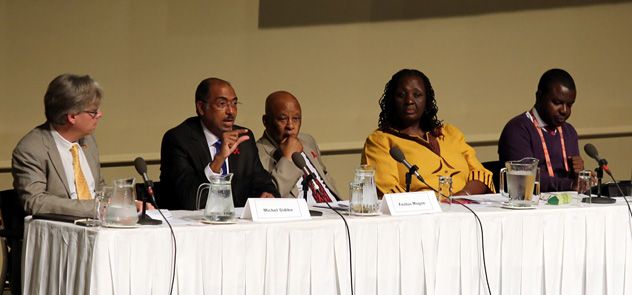

L to R: UNAIDS Chief Political Affairs and Strategy, Kent Buse; UNAIDS Executive Director, Michel Sidibé; former president of Botswana, Festus Gontebanye Mogae; UN Special Envoy on HIV/AIDS in Africa, Speciosa Wandira-Kazibwe; and Executive Committee Member of the African Youth and Adolescents Network (AfriYAN) Samuel Kissi at the Leadership Session – African leadership in the Post-2015 era at the XVII International Conference on AIDS and Sexually Transmitted Infections in Africa (ICASA) on 7 December in Cape Town, South Africa.
Update
Africa: Taking the lead in the AIDS response
09 December 2013
09 December 2013 09 December 2013The XVII International Conference on AIDS and Sexually Transmitted Infections in Africa (ICASA) opened on 7 December in Cape Town, South Africa. At the top of the agenda—discussions on how the continent is taking the lead in setting the AIDS and health agenda for 2015 and beyond.
At a session called African leadership in the Post-2015 era, African leaders, civil society and young people explored how Africa’s AIDS response could help implement health and development strategies differently across the continent. The meeting included UNAIDS Executive Director, Michel Sidibé; former president of Botswana, Festus Gontebanye Mogae; UN Special Envoy on HIV/AIDS in Africa, Speciosa Wandira-Kazibwe; and Executive Committee Member of the African Youth and Adolescents Network (AfriYAN) Samuel Kissi.
Mr Sidibé stressed that AIDS is an unfinished business and that future development goals must include a clear roadmap towards ending the AIDS epidemic. Youth representatives called for more systematic approaches to engage them in the decision-making process.
The purpose of the leadership panel Global Plan Towards the Elimination of New HIV Infections Among Children by 2015 and Keeping their Mothers Alive was to discuss the progress made and the remaining challenges in moving towards an HIV-free generation. Participants also discussed other dimensions of the Global Plan such as pediatric tuberculosis and cervical cancer.
Mr Sidibé, singer and social activist and UNAIDS International Goodwill Ambassador, Annie Lennox, and the Acting Global AIDS Coordinator of the President’s Emergency Plan for the AIDS Relief, Deborah von Zinkernagel addressed the meeting. Other special guests included the Deputy Permanent Secretary of the Namibian Minister of Health and Social Services Norbert Foster (representing Minister Dr Richard Kamwi), Special Advisor to the First Lady of Chad and former Minister of Health for Chad Ngarmbatina Odjimbeye Soukate, and Executive Director of Community Initiative for Tuberculosis, HIV/AIDS and Malaria (CITAM+) Carol Nyirenda.
Quotes
“We made progress in the response to AIDS because we took a multi-sectoral approach, engaging every part of society. My concern is that leaders are becoming complacent and that they won’t sustain this approach to AIDS and extend it to health beyond 2015.”
“AIDS provides an entry point to address a range of sustainable development challenges, from sexual and reproductive health to addressing social justice. We need a call for a goal to end AIDS by 2030. No region other than Africa can bring this call to the UN General Assembly.”
“Given strong African economic growth, now is a good time for us to call for a new African leadership for AIDS and health in the post-2015 agenda. A transformed leadership which delivers national ownership, shared responsibility and strong accountability. We must now re-engage civil society for a renewed partnership to shape a future development agenda that will work in Africa.”
“It’s an exciting moment to represent young people because more than ever we have the opportunity to ensure that our voice is taken into account. Many governments and institutions are engaging young people, who must be a central part of the future development framework.”
“HIV is complex but it brings out many dimensions in society. It’s an illustration of human beings and how we see ourselves and how we behave towards each other.”



